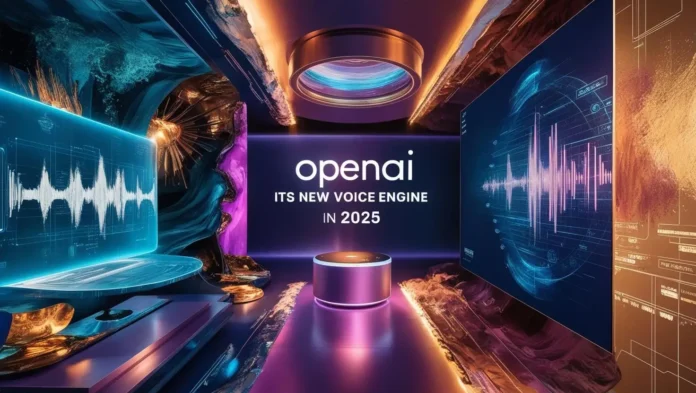In a major leap forward for AI communication, OpenAI has officially unveiled its groundbreaking Voice Engine in early 2025. This latest innovation is poised to redefine the boundaries between human and machine conversation, offering ultra-realistic, real-time speech synthesis capabilities. The announcement follows years of research and builds on OpenAI’s commitment to creating AI that can interact naturally and meaningfully with users.
Contents
What Is OpenAI’s Voice Engine?
The Voice Engine is OpenAI’s most advanced text-to-speech model to date. Unlike traditional TTS systems, which often produce robotic or overly generic speech, Voice Engine can generate speech that closely mimics human tone, emotion, and intonation after being trained on as little as 15 seconds of voice data.
Key Features:
- Ultra-Realistic Voice Cloning: Minimal voice data needed.
- Multi-Language Support: Over 100 languages and dialects.
- Real-Time Response: Latency reduced to near-human conversation speed.
- Emotional Expression: Capable of replicating human emotions such as excitement, sarcasm, or empathy.
“This technology brings us one step closer to making AI feel more personal and accessible,” said Mira Murati, CTO of OpenAI, during the official announcement.
Timeline of Voice Engine Development
| Year | Milestone |
|---|---|
| 2024 (March) | Initial Voice Engine prototype introduced |
| 2024 (October) | Realtime API Beta launched for developers |
| 2025 (March) | Public launch of OpenAI Voice Engine |
Why Voice Engine Matters
The ability to replicate human speech so accurately has far-reaching implications across industries:
- Customer Service: AI-powered agents could deliver personalized support experiences.
- Education: Language learning apps and online courses could offer more natural-sounding interactions.
- Content Creation: Podcasters and YouTubers could use AI to automate voiceovers without losing personal branding.
- Healthcare: Voice companions for elderly patients could be more engaging and emotionally supportive.
In fact, OpenAI’s Voice Engine could significantly impact accessibility technologies, providing more natural and relatable text-to-speech services for people with disabilities.
Addressing Ethical Concerns
Recognizing the risks of misuse, OpenAI emphasized that they are taking a “cautious rollout” approach. Access to the Voice Engine is currently limited to vetted partners in fields like education, assistive technology, and content creation.
Key Safeguards:
- Strict identity verification for voice cloning.
- Watermarking mechanisms to detect AI-generated speech.
- Partnerships only with organizations that comply with ethical AI guidelines.
Related Post: Google Showcases Genie 2: AI That Builds Interactive Worlds
Industry Reactions
The tech community’s response has been largely positive. Sam Altman, CEO of OpenAI, noted during a Q&A session:
“We are aware of the profound responsibility that comes with building something that so closely mimics human communication. Our focus is ensuring this technology benefits society broadly and safely.”
Meanwhile, analysts from MIT Technology Review have hailed the Voice Engine as “one of the most human-like speech technologies ever created,” though they also caution about “guardrails that must be firmly in place.”
Future Outlook for Voice AI
OpenAI’s Voice Engine launch could usher in an entirely new era of AI-human interaction. Future updates are rumored to include:
- Full-duplex conversations (simultaneous speaking and listening)
- User-selectable emotional tones
- Real-time translation combined with voice cloning
If these developments come to fruition, industries like entertainment, gaming, and virtual reality could see unprecedented innovation.
Related Post: FlexClip AI Review (2025): A Powerful Yet Underrated Video Creation Tool
Conclusion
OpenAI’s Voice Engine represents a pivotal moment in the evolution of artificial intelligence. By blending ultra-realistic speech synthesis with ethical foresight, it paves the way for more natural, impactful, and responsible AI conversations.
What do you think about OpenAI’s Voice Engine? Have you experienced similar AI-driven conversations? How do you see this technology shaping the future of communication?
Share your thoughts in the comments — we’d love to hear your predictions and perspectives!
Sources:
